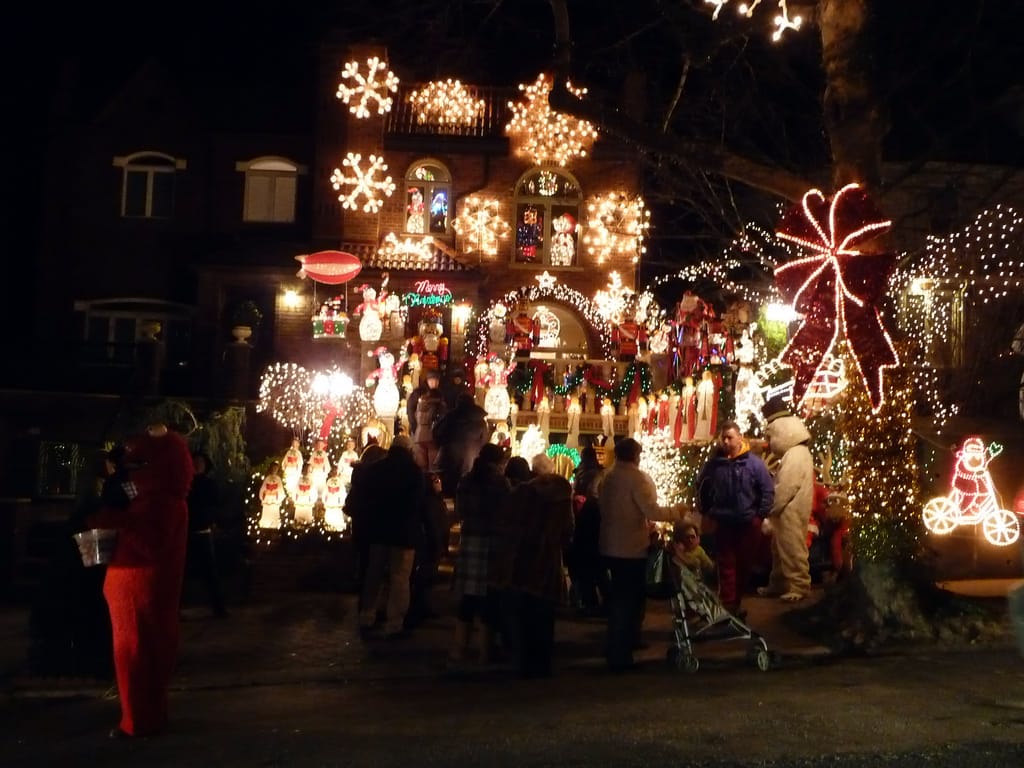Street Vending Banned in Dyker Heights During Dyker Lights


UPDATE: The bill passed City Council today. It designates a vendor-free zone from Thanksgiving to December 31 in the area surrounded by 81st Street & 86th Street and 10th Avenue and 13th Avenue. No food vendor be allowed to park a truck or set up for business even if they have a vending license from 2 pm until 6 am the next morning. (Original story published on 10/3/19)
Dyker Heights residents pleaded with lawmakers on Thursday, October 3, to quickly pass a bill prohibiting street vending during the area’s annual “Dyker Lights” festivities, arguing that the vendors’ presence creates unsafe and unpleasant conditions for both local residents and visitors.
Representatives for Community Board 10 and the Dyker Heights Civic Association testified to the City Council’s Consumer Affairs committee that the presence of street vendors, which has increased significantly as Dyker Lights becomes a bigger and bigger tourist attraction, is turning the once quaint, local tradition into an unruly carnival, and that previous attempts to ameliorate the problem without legislation had failed.
“This has continued to be an acute, recurring problem for our district,” said Laurie Willis, chair of Community Board 10.
The bill, introduced by Council Member Justin Brannan, would establish a no-go zone for all commercial street vendors in the area bounded by 10th Avenue in the west, 13th Avenue in the east, 81st Street in the north, and 86th Street in the south, which would be in effect from Thanksgiving until New Year’s Day. Residents are pushing for the bill to be passed before the lights go up this season.
The Dyker Lights festival has in recent years become a major tourist attraction during the holiday season, with busloads of tourists being dropped off to view the blocklong displays of extravagant Christmas lighting. With the tourists have come vendors, such as ice cream trucks, hot chocolate vendors, cotton candy sellers, and hawkers of various knick-knacks.
The vendors were described by hearing attendees as unruly. Ellen Canfield, executive director of the Mayor’s Office of Citywide Event Coordination and Management, told the committee that trucks can often be found parked on the sidewalk or in private driveways and frequently idle their vehicles all day, emitting both diesel and noise pollution. Further, emergency vehicles are frequently snarled from reaching destinations by the glut of both vendors and of massive crowds on the streets. Those vendors and crowds also leave behind significant amounts of trash. Oftentimes, residents have trouble reaching their own homes.
“It’s fantastic that hundreds of thousands of tourists want to come see Dyker Lights,” Brannan said, “but at what cost to the residents who live in this great community the other 365 days a year? It is completely unfair to them.”
Previous attempts to address the problem have been a bust. Because the lights are put up on private homes and properties, the city in 2016 denied a request by CB10 that Dyker Lights become a permitted, regulated event. While it’s unlikely that interest in Dyker Lights will subside any time soon, the absence of street vendors would likely reduce congestion in the neighborhood during the holiday season, according to attendees.
“This is a smart, simple, narrowly tailored piece of legislation,” Willis said, “that will go a very long way to address not only the quality of life issues but also the safety issues.”




